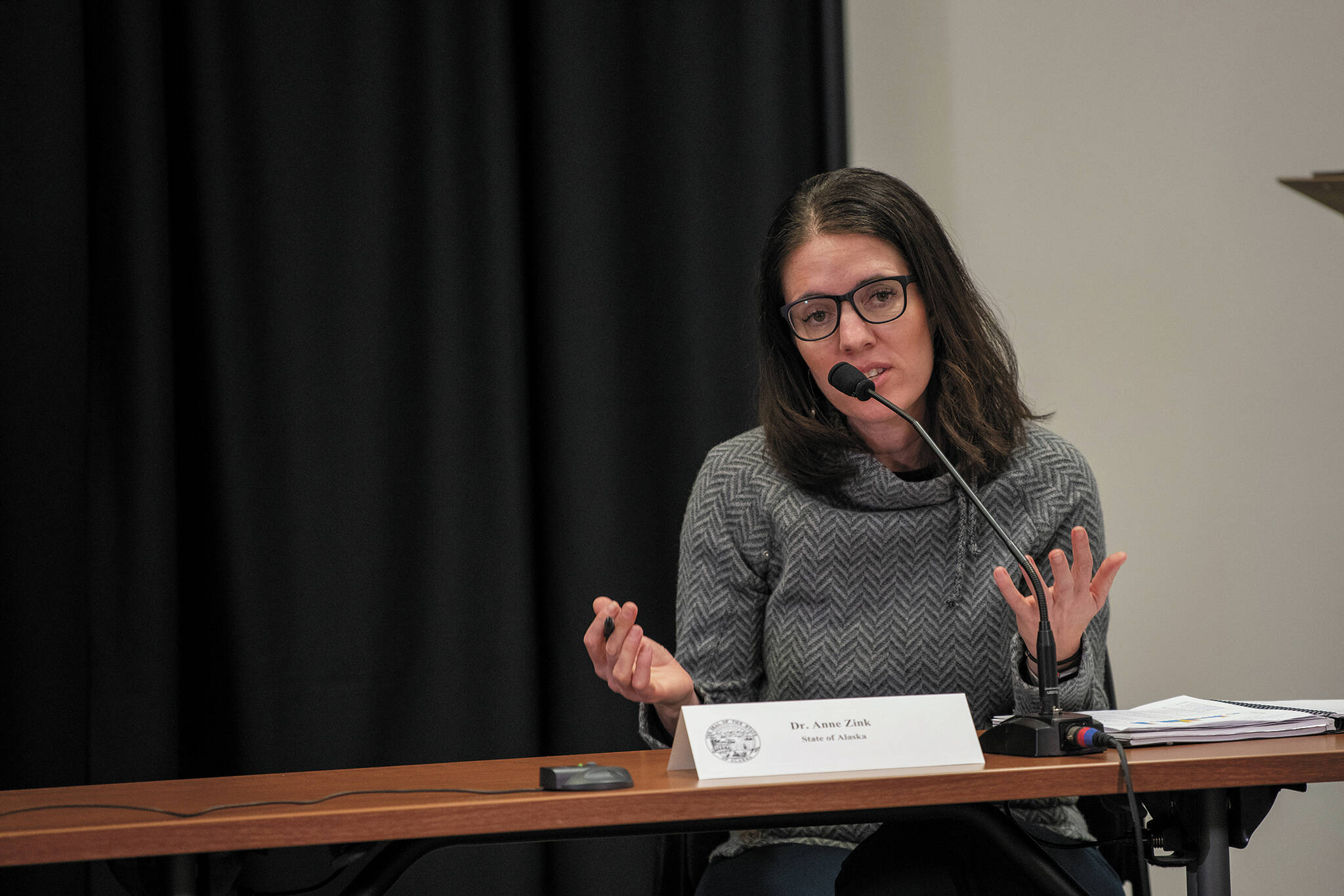As COVID-19 cases are falling in Alaska and nationwide once again, health officials are pondering what other kinds of health implications survivors of the disease will face.
Chief Medical Officer Dr. Anne Zink said during a media briefing last Thursday that many different kinds of viruses can cause long-term health repercussions.
“It’s not uncommon for viruses to cause changes in the immune system, changes in the way that the heart responds, long-term symptoms and side effects, so this is not unique to COVID,” Zink said. “But I think we will be learning for a long time what this looks like, so how this changes life expectancy? I don’t think we have any answer to that question yet.”
According to the Centers for Disease Control, most people who contract COVID get better within weeks of illness. But some can experience post-COVID symptoms four or more weeks after first being infected. Some of those symptoms include difficulty breathing, coughing, issues sleeping, lightheadedness, fatigue and difficulty concentrating, among many others.
Some of the multiorgan long-term consequences can affect the multiple systems in the body, including heart, lung, kidney, skin and brain functions. The CDC also has data showing that some people, who are mostly children, can experience multisystem inflammatory syndrome, although it’s rare. MIS is a condition where different body parts can become inflamed.
State Epidemiologist Joe McLaughlin said during the briefing Thursday that long COVID doesn’t always only cause physical health issues.
“It also can include mental health issues,” he said.
The findings of a study from the peer-reviewed British Medical Association journal suggest that people who had contracted COVID were at an increased risk for anxiety, depressive, sleep and stress and adjustment disorders, as well as substance use disorders.
McLaughlin also said that most long COVID cases occur with people who were severely ill from the virus.
Health officials emphasized Thursday that vaccination is the best way to minimize the impacts of COVID in Alaska — both on an individual level and for the greater community.
According to state data, 63.6% of Alaskans over the age of four had completed their primary COVID vaccine series. Another 26.6% had received a booster.
In the Kenai Peninsula Borough, 48.8% of folks had completed a primary series and 22.9% had received a booster as of Friday.
Those vaccination rates are slowly increasing as Alaska is on the back side of the omicron wave. Cases were down 47% the week of Feb. 11 to 17 compared to the week prior.
Friday, the state reported a two-day combined total of 1,150 new cases sequenced from Feb. 16 to 17. New cases reported Friday included 27 in Soldotna, 18 in Seward, 14 in Homer, four in Sterling, three each in Anchor Point and the Kenai Peninsula Boroughs North and South, and two in Nikiski.
In addition to vaccination, state health officials said multiple approved COVID treatments have high efficacy rates. They include monoclonal antibody treatments, as well as oral antiviral medications.
Getting a vaccine
COVID-19 vaccines do not cost money.
The Pfizer-BioNTech vaccine is approved for everyone 5 years and older, while the Moderna and Johnson & Johnson/Janssen vaccines are approved for anyone 18 and older.
Moderna’s vaccine also got fully approved by the Food and Drug Administration for those 18 and older last week, and Pfizer’s vaccine got full FDA authorization for people 16 and older last August.
In addition to a primary series — two doses of the Pfizer or Moderna vaccine or one dose of the Janssen vaccine — experts are strongly encouraging booster shots to protect against omicron.
The FDA and CDC are recommending Pfizer boosters for anyone 12 and older at least five months after the primary series. Additionally, Moderna boosters are recommended for anyone 18 and older at least six months after a primary series.
Janssen boosters are approved for anyone 18 and older at least two months after initial vaccination, although state health officials say the Janssen shot isn’t the preferred vaccine because of risks of blood clotting and less robust protection against COVID. The state recommends people with a primary Janssen vaccine to get either a Pfizer or Moderna booster.
Many organizations on the central peninsula — including Walmart, Walgreens, the Kenai Fire Department and Kenai Public Health — offer vaccines.
Additionally, Soldotna Professional Pharmacy hosts a walk-in clinic in its strip mall storefront at the “Y” intersection of the Sterling and Kenai Spur highways. The clinic is open from noon to 6 p.m. Monday through Friday and 10 a.m. to 2 p.m. on Saturday.
Vaccination appointments can also be scheduled through the online portal PrepMod, which can be accessed at myhealth.alaska.gov.
A map of vaccine providers can be found on DHSS’ COVID-19 vaccine website at covidvax.alaska.gov.
People who would like assistance scheduling a vaccination appointment can call the Kenai Peninsula Borough Office of Emergency Management call center. The center operates Monday through Friday from 9 a.m. to noon. The central peninsula call center can be reached at 907-262-4636. The Homer call center can be reached at 907-235-4636. The Seward call center can be reached at 907-224-4636.
Testing locations
Officials encourage anyone with symptoms to test for COVID-19, despite vaccination status.
In Kenai, testing is available at Odyssey Family Practice, Kenai Public Health Center and Capstone Clinic. At-home test kits are also available for free at Kenai Public Health.
In Soldotna, testing is available at the Peninsula Community Health Center, Urgent Care of Soldotna, Walgreens and Soldotna Professional Pharmacy.
In Homer, testing is available at South Peninsula Hospital, or through other area health care providers at Seldovia Village Tribe Health and Wellness, Kachemak Medical Group and Homer Medical Center. In addition, Capstone Clinic in Homer will be offering drive-thru tests Monday through Friday from 9 a.m. to 4 p.m. through Friday. Register with the COVID Secure App before arriving.
In Seward, testing is available at Providence Medical Center, Chugachmiut-North Star Health Clinic, Glacier Family Medicine, Seward Community Health Center and the Safeway pharmacy.

